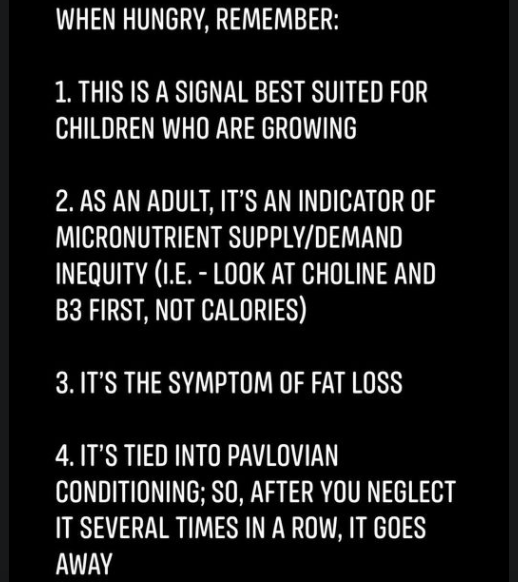|
1. The standard time period for George Cahill’s medical research on starvation went up to 6 weeks: https://thehealthsciencesacademy.org/wp-content/uploads/2015/07/Fuel-Metabolism-in-Starvation_ReviewArticleTIMM2008-9Lazar-1.pdf. There is a published paper on a 382 day therapeutic fast: https://www.ncbi.nlm.nih.gov/pmc/articles/PMC2495396/.
2. With choline supplementation alone, many people CANNOT feel hunger. I’ve had clients lose over 100lbs of bodyweight just with nailing choline dosing. Given our central neurotransmitter is acetylCHOLINE, it would make sense that as we use it up we would powerfully (perhaps overwhelmingly) hunger. Moreover, there is evidence of dietary choline intake association with improved body composition: https://www.ncbi.nlm.nih.gov/pmc/articles/PMC4863971/. 3. Ask anyone who has reliably BECOME lean. I’m not talking about skinny or ectomorphic people who become fitness influencers without ever gaining or losing significant body fat. I’m talking people like me who’ve purposely lost 70lbs. Or people who’ve gained and cut repeatedly to increase overall muscle size. We look forward to feeling hunger as confirmation of crossing the fat loss threshold. Moreover, the hunger hormone is connected to positive changes in Growth Hormone. So you do actually want to feel hunger regularly to live longer and better. 4. A lot of times people merely feel hunger (or cravings) at a time period which they’ve trained their brains to expect food. If so, identify those times and go without 3 days in a row in order to begin retraining the conditioning switch by at least 20%. Around 3 consecutive weeks there will be at least an 80% reduction in hunger at those times. I've repeatedly observed this and wonder if it's where the "21 days to form a new habit" farce came from. There is certainly power in three consecutive experiences when we discuss conditioning responses and behaviors. Three days. Three meals. Three arguments. Three weeks. Three warnings. Three months. Three lies. Three years. Three meetings. Three wrongs. Three lessons. However, in research on the formation of habits, we find the average time it takes for 95% adherence to new habit is 66 days: http://repositorio.ispa.pt/bitstream/10400.12/3364/1/IJSP_998-1009.pdf. Since that study came out, I've been unable to shake its uncanny resemblance to three consecutive blocks of 22 days. Each block being one day more than the anecdotal three weeks we long heard prior to that study. Thus, perhaps it's best to say you won't even give yourself a chance until you do three consecutive days. You can call it a new and fragile habit at three consecutive weeks. Around sixty-six days is when it becomes a bit more reliable and trustworthy.
0 Comments
Your comment will be posted after it is approved.
Leave a Reply. |
Elev8 Wellness
|
LIVE. AWESOME.We offer the highest quality in personal fitness, nutrition, and mindset coaching, helping you achieve your fitness, health, wellness and performance goals no matter the obstacle. With virtual online training and private, in-studio training we make it easier to reach your wellness goals safely.
No more can't. No more not good enough. If you compete in a sport, let your mind no longer hold you back from being the greatest. If you don't, let your mind no longer hold you back from being the best version of you that you can be. Sign-up for a Tour Covid Screen Waiver Elev8 Waiver Become an Elev8 Instructor Space Rental |
6244 lyndale ave. s., minneapolis, mn 55423
|
© 2021 Elev8 Wellness LLC. All Rights Reserved. site map | contribute | SITE BY Sproute Creative


 RSS Feed
RSS Feed
